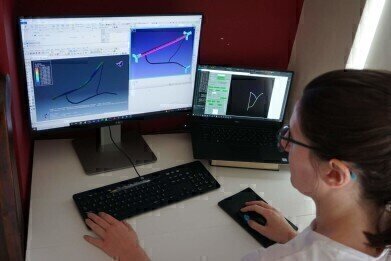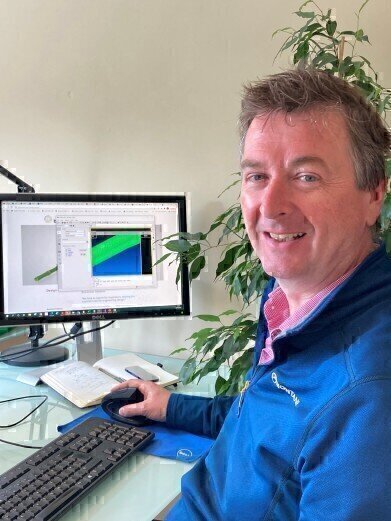-
 Dr Imelda Friel from Queen's University Belfast works on the innovative cyber seed. Credit: Queens University Belfast
Dr Imelda Friel from Queen's University Belfast works on the innovative cyber seed. Credit: Queens University Belfast -
 Professor Mark Price Credit: Queens University Belfast
Professor Mark Price Credit: Queens University Belfast
News & Views
Distributed Manufacturing - will Cyber Seeds Nurture your Design?
Jun 24 2021
“This cyber seed grows within a computer model just like a stem on a plant does in nature - it gets longer and longer as it grows.” – Mark Price.
An idea conceptualised by researchers to enable generation of new products – bespoke to end users anywhere in the world and employing the materials they have to hand – is now being brought to life by a team of experts from Queen’s University Belfast, Loughborough University and the University of York.
The engineers have been awarded £7.3 million by EPSRC for the ‘RIED’ (Re-Imagining Engineering Design) project to develop the first-ever manufacturing ‘cyber seed’ which grows just like a plant and can be designed for end users and suited to local environmental resources.
Making manufacturing accessible
Professor Mark Price, from the School of Mechanical and Aerospace Engineering and project lead at Queen’s University Belfast, said: “This new research could really transform how design and manufacturing organisations work, making manufacturing more accessible to many sectors, efficient and distributed.”
The cyber seed is made up of simple text descriptions of a product’s design characteristics and attributes, such as size, colour and density; these ‘genes’ are read by software configured to link with a computer aided design (CAD) system for creation of a 3D design model ready for manufacture and realisation.
Professor Mark Price explains: “This cyber seed grows within a computer model just like a stem on a plant does in nature - it gets longer and longer as it grows. The seed generates cells which divide and copy to build up very complex shapes but they only become viable when they meet certain conditions, in the same way nature works. For example, if we have a seed for a bicycle and it is being produced by a researcher in Belfast for a customer in Belfast, the available materials may be metal and the end product would be made of aluminium. However, if the same researcher in Belfast is using the cyber seed to create a bicycle for a customer in Asia but the only available material was bamboo, the seed would pick up on this and adapt the design so that a bamboo bicycle could be produced instead.”
Potential for Opportunities in the Medical and Bioengineering Field
This new approach to ‘Design and Manufacture and Deployment’ could unlock a wealth of opportunities for the medical and bioengineering sectors. It means that it will be possible to generate patient-specific devices or therapeutic specimens that are customised, and crucially the cost and resource needed to manufacture them will not be prohibitive.
Dr Carmen Torres-Sanchez from Loughborough said: “This flexibility will allow the treatment of new diseases and the rehabilitation of patients who need, for example, a frequent change of orthopedics or an implantable device that releases medication attuned to the patients’ needs along the course of a treatment.”
Professor Paul Conway, the Loughborough University lead, commented: “Our approach is inherently flexible and agile, which is particularly important in designing current and next generation products, that often have multiple concurrent and interacting functions embodied and created within new challenging situations, such as the circular economy. The programme allows these challenges to become real opportunities for future innovations.”
Professor Andy Tyrell, Head of Department at the University of York’s Department of Electronic Engineering, said: "This exciting new project continues the work we have been doing in the Department of Electronic Engineering at York considering novel inspiration from natural systems and adapting these to engineering systems and components.
“This project will move our work to the next level with very strong industrial partnerships, working with Queen’s and Loughborough universities. The group at York will be focusing on the evolution of the cyber seeds that will ultimately grow to form innovative designs."
RIED will be supported by Airbus, Glen Dimplex, ITI, Rolls-Royce, Denroy, SAM UK, MTC, Far UK, OxMet, Bombardier (Spirit Aerosystems) combining the significant research background of the academic institutions with the industrial pedigree of the partner companies.
More information online
Digital Edition
Lab Asia 31.2 April 2024
April 2024
In This Edition Chromatography Articles - Approaches to troubleshooting an SPE method for the analysis of oligonucleotides (pt i) - High-precision liquid flow processes demand full fluidic c...
View all digital editions
Events
Apr 28 2024 Montreal, Quebec, Canada
May 05 2024 Seville, Spain
InformEx Zone at CPhl North America
May 07 2024 Pennsylvania, PA, USA
May 14 2024 Oklahoma City, OK, USA
May 15 2024 Birmingham, UK

















